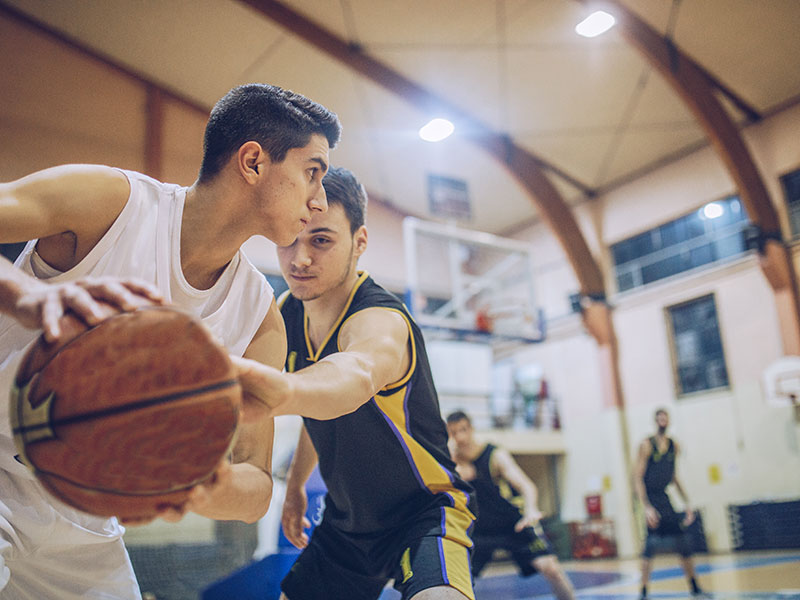Sanford Heath neuropsychologist Dr. Josefine Combs has a sports background that helps her identify with the challenges of being an athlete.
As anyone who has ever witnessed the agony of defeat can attest, finding a sense of peace can be elusive at times, especially when combined with the emotional intensity of competition.
Sorting it all out can build emotional resilience that will serve athletes well, but that same process can be a challenging part of life from day-to-day. This is especially true for young people juggling all sorts of tasks from the time they get up until they go to bed.

“I think student-athletes are incredible,” Dr. Combs said. “They’re hard workers and they’re extremely dedicated. A lot of people don’t understand how much goes into that. A lot of kids wake up early to go to practice before school, then they have a full day of school, then potentially more practice, homework and games on the weekends.”
As a neuropsychologist, Dr. Combs devotes a lot of time to helping athletes assess, manage and treat concussions at Sanford Health. She also serves as a sports psychologist. In both roles she helps athletes get past barriers that may be invisible to others.
Dr. Combs starts with conversation
“It’s very hard to separate some of the things athletes deal with,” Dr. Combs said. “Each person has more than one role. They’re not just athletes. They’re also students, they’re also sons and daughters and sisters and brothers and teammates. And maybe they’re into art or music and whatever else. We all wear many hats.”
If, for example, there is anxiety in one of those roles, it can creep into other areas. A bad day at practice, for instance, can become a bad day in the classroom or at home.
Nationally, several well-known athletes over the last decade have begun to open up about their issues with mental health. It includes people like swimmer Michael Phelps, tennis player Serena Williams and basketball player Kevin Love.
Some of the same factors that contribute to struggles with mental health among well-known athletes can play a role in contributing to problems for amateur athletes of all ages and levels.
Find training and support: Athletic services at Sanford Health
That is where someone like Dr. Combs can help. As a former college volleyball player who grew up in Germany, she is familiar with the pressures of competition that can lead to stress and anxiety.
“We start by having a conversation with athletes,” Dr. Combs said. “We find out how they perceive their situation. What do they think the cause is for what they’re feeling? Most people know when something isn’t quite right. Kids may not be able to articulate it in the same way an adult can but they know.”
Studies indicate that while being physically active can be a great benefit to mental health, athletes are far from immune from dealing with the inherent obstacles and anxieties associated with sports.
One study found that nearly 24% of Division I college athletes experienced depressive symptoms that reach clinically relevant levels, and that more than 6% have moderate to severe depression.
“We’ve seen changes in recent years with teenagers and their schedules,” Dr. Combs said. “The average teenager is much busier than they used to be. With that comes more stress. And it’s not just sports. It’s all extra-curricular activities.”
Addressing issues
So how does a sports psychologist like Dr. Combs address issues with athletes who are experiencing symptoms of mental illness?
In broad terms, the approach can parallel how one might address recovering from physical injuries.
“We develop a plan to collaboratively tackle the things the individual has set as goals that they want to achieve, or in this case, how they want to improve on the things they feel like they are lacking,” Dr. Combs said.
Once targets are established, Dr. Combs said, the tackling process begins. Improving one’s mental approach to sports does not necessarily have to start with a problem. It can start with an attempt to get better at it.
Establishing resilience
Regardless of where that road starts, it leads to establishing improved emotional resilience.
“There are basically three major parts of building resilience,” Dr. Combs said. “First, athletes need to shape their thinking: If I’m faced with an obstacle, am I going to view this as a difficulty that’s in my way or am I going to view it as a challenge — something where I get a chance to test my abilities and will make me stronger?”
The second element is commitment. Resilient people are committed to the goals they set for themselves. It helps, not surprisingly, if the athletes love what they’re doing.
“Caring about what you’re doing keeps you invested,” Dr. Combs said.
The third element is personal control.
“A lot of resilient people are very good at exerting the control they have,” she said. “They will do the things they can do to control a situation. For example, if I know I have a hard time waking up in the morning and that puts me at risk to being late, what can I do to help that? Maybe I pack my bag for practice the night before and have it sitting next to the door.”
‘Do as I say …’
The younger the athlete, the more prominent the role of parents and the people who coach them. That guidance comes in many forms. Some methods are better than others.
As an example, there is the old saying that asserts that young people should “do as I say, not as I do.”
“We know it actually doesn’t work very well if that’s how you’re going to do it,” Dr. Combs said. “Kids do better when they see parents stick to schedules as well. They do better with parents who keep their words. If they say they’re going to do this, then they’re going to do this. It follows through and kids create good habits for themselves.”
The pressure to succeed, viewed as strictly as a win-lose proposition, will always be a problem. Viewed on a wider spectrum, however, sports and competition can be a great asset to youth and young adults. Finding balance is the key.
“Sports can help create an incredibly enriching environment for kids,” Dr. Combs said. “There are life lessons — things like being part of a team, accountability, learning how to better interact in groups and learning how to work hard for something. Kids benefit from all these things and be better because of it.”
Read more
- Concussion management in sports: Taking the hard hits
- Sanford Health, UND announce behavioral health collaboration
- Two-time Olympian counsels and coaches at Pentagon
…
Posted In Behavioral Health, Brain & Spine, Orthopedics, Sioux Falls, Specialty Care, Sports Medicine
